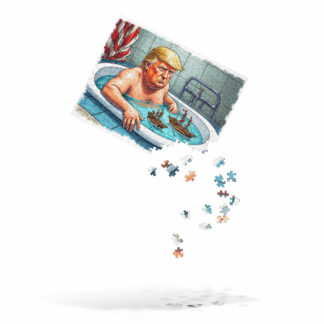Transforming the Ancient Art of American Lawmaking
It’s Time To Take The Torch If They Won’t Pass It

Modernizing Congress is necessary for America to thrive. Congress’s outdated processes for lawmaking and budgeting are long overdue for reform. The current system treats funding proposals like immutable legislation, creating unnecessary political storms and inefficiencies. Congress blends budgets with the rigidity of lawmaking, transforming each decision into a partisan battlefield instead of focusing on allocating resources. To move forward effectively, we need to focus on modernizing Congress—both its tools and its accountability mechanisms—so that the government can work better for the people it serves.
Why the Current System Fails
Congress’s budgeting process clearly shows deep flaws. For example, lawmakers politicize administrative financing by treating budgets as legislation. As a result, this approach escalates conflict and prevents lawmakers from taking meaningful accountability.
Furthermore, there is currently no system in place to ensure lawmakers face consequences for dysfunction. For example:
- Lawmakers’ paychecks remain untouched during shutdowns.
- Their investment portfolios are unaffected by government failures, even when their decisions—or lack thereof—contribute to the chaos.
Adding to this inefficiency is Congress’s reliance on archaic tools like LaTeX—a decades-old text formatting system used to draft legislation and budgets. It’s as if Moses were carving the 10 Commandments into stone tablets. While such rigidity might make sense for defining immutable laws, it’s utterly unsuitable for fluid and collaborative processes like budgeting. This outdated system creates unnecessary barriers to transparency and adaptability, making the entire process less effective and accessible
Pelosi’s “Greed the Capitol” Strategy
Nancy Pelosi’s leadership epitomizes the inefficiencies of the current system. Critics have mocked her so-called environmental initiatives as “Greed the Capitol,” accusing her of prioritizing market interests over public service.
Allegations that her policies and actions benefit her investment portfolio rather than her constituents have only strengthened this perception.
Pelosi’s approach to breaking quorum reveals another layer of dysfunction. Historically, the Reed Rule required lawmakers to name themselves during roll call, ensuring transparency and accountability. Pelosi employs a tactic often dubbed the “Pelosi Filibuster,” where she creates fake public arguments while conducting the real negotiations behind closed doors. This strategy undermines the quorum process entirely, leaving the public with theatrical debates that mask the actual decision-making.
This method highlights a fundamental flaw in Congress: the lack of transparency and sincerity. Lawmakers hide real discussions from view and present issues to the public that are often irrelevant to the actual outcomes.
A Blueprint for Modernizing Congress
To fix these systemic issues, Congress needs both structural reform and updated tools that prioritize accountability, transparency, and functionality.

1. Adopt Modern Tools
Congress currently relies on archaic systems like LaTeX to draft legislation and budgets, which ultimately make the process opaque and inaccessible. By contrast, adopting collaborative platforms like Google Docs would enable Congress to create more transparent and interactive documents.
- Line-by-Line Clarity: Every funding item could be accompanied by explanations, historical data, and contributions from both lawmakers and citizens.
- AI-Driven Insights: AI tools could summarize proposals, flag inefficiencies, and highlight risks, making the process more efficient and understandable.
2. Separate Funding from Legislation
Budgets should not be treated as legislative battles. Administrative financing needs to focus on resource allocation, while laws should address broader governance issues. This separation would reduce unnecessary conflict and allow Congress to work more efficiently.
3. Introduce Real Accountability
Lawmakers should face consequences for government failures. For instance:
- Delayed Paychecks: Their compensation should be tied to government functionality.
- Performance-Linked Investments: Their portfolios could be impacted by government shutdowns or legislative gridlock, creating a personal incentive to avoid dysfunction.
4. Reinforce Quorum Rules
Reinstating the Reed Rule would ensure lawmakers publicly identify themselves during roll calls. This would hold members accountable for their participation and eliminate the ability to hide behind procedural games.
Why Modernizing Congress Matters
Modernizing Congress isn’t just about updating tools or processes—it’s about restoring trust in the institution. When lawmakers prioritize performative politics over real solutions, they fail the people they were elected to serve. Figures like Pelosi, with their opaque tactics and questionable priorities, represent the dysfunction that must be addressed.
By implementing these reforms, Congress can effectively transition from a system of theatrical debates and hidden negotiations to one that prioritizes transparency, fosters collaboration, and enforces accountability.
A Modernized Congress Is Key to Progress

Performative politics must end. Congress must embrace modern tools, separate funding from legislation, and enforce accountability measures that push lawmakers to focus on results instead of rhetoric. Modernizing Congress will create a system that works for the people, prioritizes transparency, and delivers meaningful change.
We must stop carving laws and budgets into stone tablets and instead start building a future that truly reflects the needs and values of the American people. Moreover, modernizing Congress marks the critical first step toward restoring functionality, trust, and accountability in our government.















